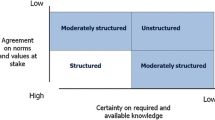Abstract
Critics of my book, Sustainability, have raised many objections which are addressed. In general, I emphasize that the book is an integrative work; it must be long and complex beause it attempts a comprehensive treatment of problems of communication, of evaluation, and of management action in environmental discourse. I explain that I depend upon the pragmatists and on work in the pragmatics of language because the current language of environmental policy discourse is inadequate to allow deliberative processes that can reach consensus and cooperative actions. I revise my account of risk analysis somewhat, and defend my broad approach to the concept of sustainability. Finally, I discuss applications of my book to the current situation in environmental policy discourse.
Similar content being viewed by others
References
Bromley, D. W., Sufficient Reason: Volitional Pragmatism and the Meaning of Economic Institutions. Princeton, NJ: Princeton University Press, 2006
Dryzek, J. S. (1997). The Politics of the Earth: Environmental Discourses. Oxford: Oxford University Press
Gunderson L. H., C. S. Holling (eds.) (2002). Panarchy: Understanding Transformations in Human and Natural Systems. Washington, D.C.: Island Press
Hajer, M. A. (1995). The Politics of Environmental Discourse: Ecological Modernization and the Policy Process. Oxford. Oxford University Press
Holling C. S., L. H. Gunderson, S. Light (eds.) (1995). Barriers and Bridges to the Renewal of Ecosystems. (New York: Columbia University Press)
Lee, K. (1993). Compass and Gyroscope. Washington, DC: Island Press
Norton, B. G. (1986). Conservation and Preservation: A Conceptual Rehabilitation Environmental Ethics 8: 195–220
Norton, B. G. (1987), Why Preserve Natural Variety?, Princeton, NJ: Princeton University Press
Norton, B. G. (1984). Environmental Ethics and Weak Anthropocentrism. Environmental Ethics 6: 131–148
Norton, B. G. (1989). Intergenerational Equity and Environmental Policy: A Model Using Rawls’s Veil of Ignorance Ecological Economics 1: 137–159
Norton, B. G., Toward Unity Among Environmentalists. New York: Oxford University Press, 1991
NRC (National Research Council) (1983). Risk Assessment in the Federal Government. Washington, DC: National Academy Press
NRC (National Research Council) (1996). Understanding Risk: Informing Decisions in a Democratic Society. Washington, DC: National Academy Press
Sagoff, M. (2004). Price, Principle, and the Environment. New York, NY Cambridge, UK: Cambridge University Press
Solow, R. M. (1993). Sustainability: An Economist’s Perspective. In R. Dorfman, N. Dorfman (eds.), Economics of the Environment. Selected Readings. New York: Norton
Rawls, J. (1971). A Theory of Justice. Cambridge, MA: Harvard University Press
Wondollek, J. M., Yaffee S. I. (2000) Making Collaboration Work: Lessons from Innovation in Natural Resource Management. Washington, DC: Island Press
Author information
Authors and Affiliations
Corresponding author
Rights and permissions
About this article
Cite this article
Norton, B.G. A Reply to My Critics. J Agric Environ Ethics 20, 387–405 (2007). https://doi.org/10.1007/s10806-007-9046-9
Accepted:
Published:
Issue Date:
DOI: https://doi.org/10.1007/s10806-007-9046-9




